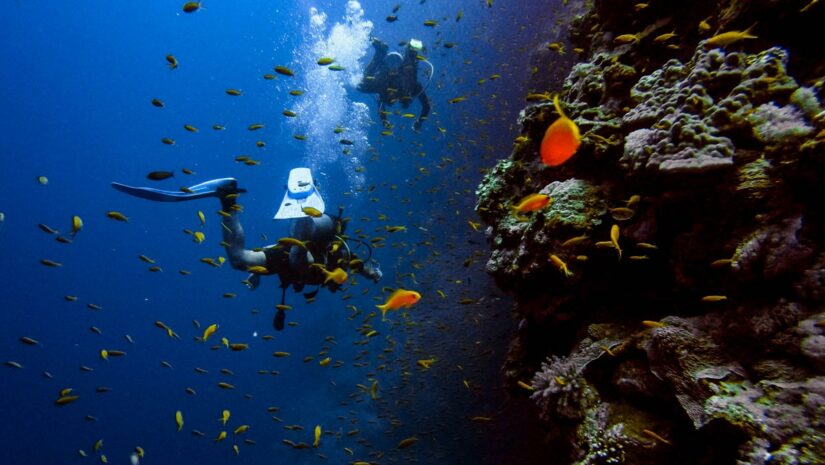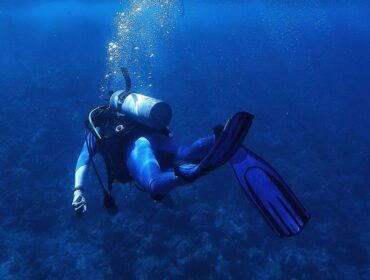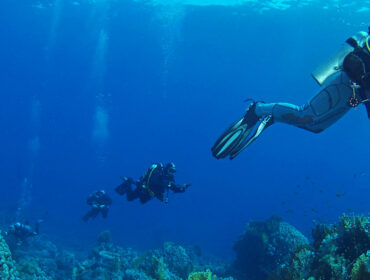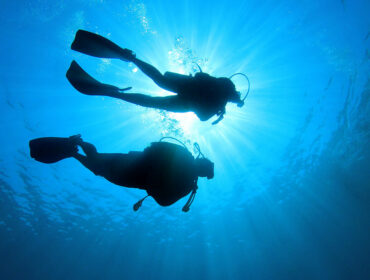Scuba diving is one of the only sports that’s both exciting and relaxing. You’ve likely seen it in movies like James Bond or 20,000 Leagues Under the Sea. Scuba diving allows you to see parts of the world that only a small percentage of people get to explore, and learning to dive by earning your scuba diving certification is really fun.
If you’re thinking about taking up scuba diving but you’re not sure where to start, we’re here to help you. We have all the information you need about how to get your scuba diving certification. Let’s dive straight in.
What is Scuba Diving and why should I try it?
SCUBA is actually an acronym. It stands for Self-Contained Underwater Breathing Apparatus (there’s some good trivia to remember for future quiz nights!).
Scuba diving is a way to explore the underwater world, and to do it without an air supply from the surface. You take the air with you in a tank that you hold on your back. This is the exact same air as we breathe on the surface: 21% oxygen and 79% nitrogen. It just gets compressed into the tank so you can take it with you underwater.
There are many reasons to learn to scuba dive. Here are just a few:
- Exploration: The fascinating underwater world is home to 50-80% of all life on Earth, from huge whales, to tiny plankton. Many people have scuba diving on their bucket list because they want to see the world, and as the world is 71% water, you can’t really see it all until you look under the waves.
- Weightlessness: Many scuba divers compare diving to flying. It makes you feel completely weightless, you can hover in the water and check out all the pretty fish and corals without exerting much energy. Once you get the hang of it, it’s very relaxing.
- Stress relief: Scuba diving allows you to bring your attention to your breathing, this has been proven to help calm the mind and encourage peace of mind. The underwater world is nearly silent — you might hear the crunch from a parrotfish chowing down on some coral, or a whale calling out to its family — but all of the loud noises of everyday life disappear and you can completely zone out. Scuba diving can be a form of meditation, a pause button on your worries for 30 minutes to an hour. While you’re underwater, it’s just you and the sea.
- Every dive is different: You know when go for a walk in your local park, you can largely guess what you’ll expect to see? Scuba diving is entirely different. You can dive the same spot 100 times and each of those dives will be unique. You’ll spot different marine life every time, and the time of day can even make a huge difference to a dive. Certain fish around at dawn and others that like to come out at dusk.
- Meet awesome people: The scuba diving community is very special, when you book a dive trip, everyone there has one thing in common: their love of diving. Conversation comes easy as you swap stories about previous dives and bond over your favorite fish. You’ll make friends for life.
- Health benefits: Scuba diving doesn’t just relieve stress, it’s also been proven to improve flexibility, mobility, and strength, and it can even lower blood pressure.
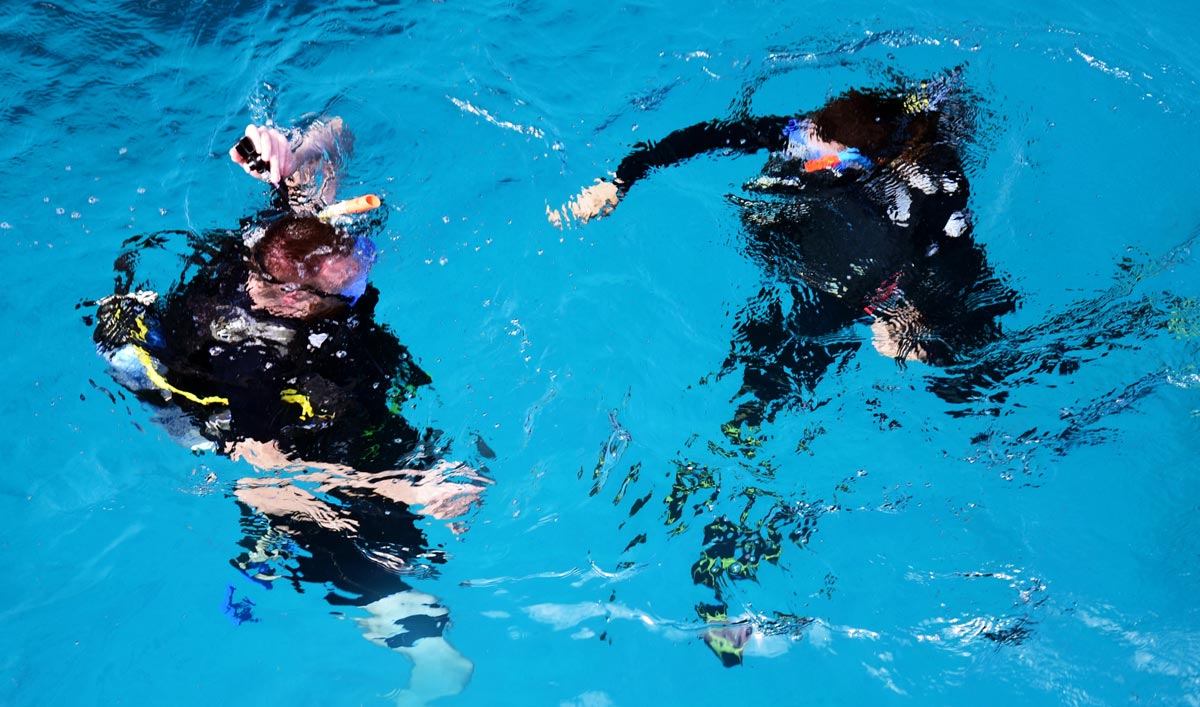
Why do I need to get certified?
Now that you’re dreaming of beautiful corals and fish, you’re ready to dive in. You have a friend with a spare tank and gear, so you can just go with them, right? Wrong!
Even if you’re already a confident swimmer in the water, it is extremely important that you learn how to dive properly. There are certain safety procedures you really need to learn and practice in the company of a trained professional.
Scuba agencies have spent years and years perfecting the scuba diving certification so that they cover everything you need to know to prepare you for any underwater situation.
As well as important safety practices, the beginner course will also teach you how to use your equipment efficiently. For example, learning how to master buoyancy not only makes your air last longer (you don’t kick so much to keep yourself in position so you won’t become out of breath) but it also protects corals and marine life from being kicked and destroyed or hurt.
Once you have your scuba diving certification, you are allowed to go diving with a buddy (some countries and regions require you to have a dive guide. It’s important to check local rules). You should only dive without a guide if it’s a dive site that you know very well, the conditions of the water look nice and calm, you have proper diving and safety equipment, and you are accompanied by a certified buddy.
And absolutely never dive alone. This is an important rule.
What do I need to know before starting my beginner Scuba Diving course?
First, you will need to decide where you want to learn. Some people like to learn while they’re on vacation with nice, warm waters that host exotic fish, and where they can sunbathe between dives.
Meanwhile, others would prefer to learn near to where they live, so they can save their holiday time for fun diving. But, unless you live near the beach, you might be doing your scuba diving course in a quarry or lake, which could mean bad visibility and cold water. It’s worth researching your local dive area and finding out what the conditions are like and then making your decision.
If the water is cold, your instructor will provide you with a thick wetsuit or even a dry suit to complete your course.
It is possible to do the theory and confined water dives (dives in a pool or shallow water) at home and then save the open water dives for your vacation. Tell your local dive center that this is what you’d like to do and they will track your progress with a “completion form”. This form tells the next dive center what you’ve already completed. You have to finish the entire course within one year of starting.
Next, you might want to invest in some of your own equipment for the course. Most dive centers will provide you with everything you need, however some people like the comfort of their own gear. For beginners, start slowly with a mask that fits your face nicely, a snorkel, and a comfortable pair of fins are easy to travel with and can also be used for snorkeling.
Before you book your scuba diving certification course, here are a few things you need to confirm:
- You’re 10 or older (under 12’s will need parental consent)
- You can swim 200 meters/yards without stopping
- You can tread water/float for 10 minutes
- You are in good health: You will have to fill out a medical questionnaire before your course. If you’re worried that you could have a health issue that might affect you while diving, visit your doctor before scuba diving
(These are based on the PADI Open Water Course, other agencies may vary).
Now you’re ready to book your Open Water course (that’s what they call the beginner course)!
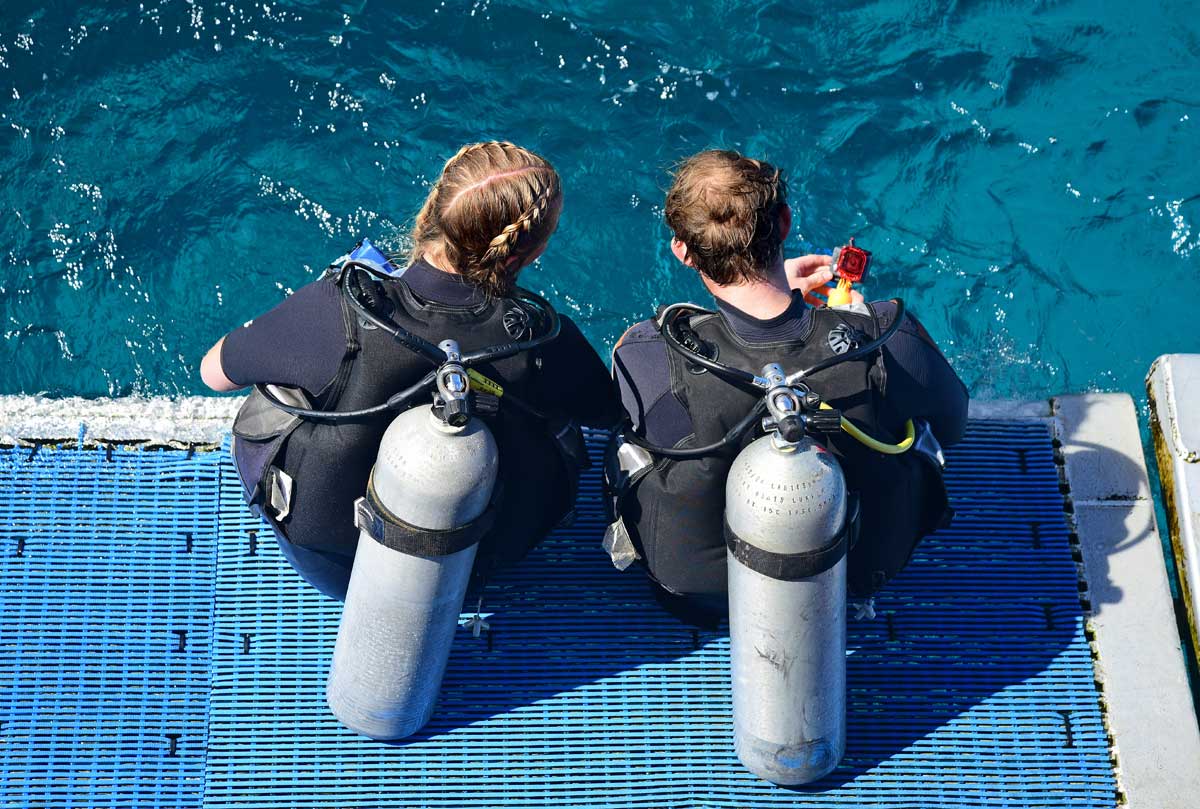
What will I learn in my Open Water course?
By now you’re probably very excited about learning to scuba dive. Let’s look at what you will learn in your beginner scuba diving certification course.
You will learn diving theory, and this will be a mix of physiology, physics, dive equipment, marine life, and dive safety. You will be given a manual that you can read before the course starts, with knowledge reviews to complete so the instructor can check your understanding as you go. You will also have an exam that you have to pass to become an Open Water certified diver.
Your instructor will introduce you to your equipment, show you how to assemble and disassemble it, as well as how to clean it and take care of it. They will explain how to perform a buddy check before entering the water, and how to wear the equipment for diving.
The course consists of six confined water dives and four open water dives:
Confined water is shallow water with nice, pool-like conditions. This is a perfect place to learn and practice skills that help you to become a good diver. You will learn skills to perfect your buoyancy, skills that help you to keep calm underwater, skills that ensure your safety, and you’ll practice what to do in different diving emergencies. It is important to have the skills should you ever need them.
Open water is deeper water (16ft/5m or more). In the open water you will be putting the skills you learned in the confined water to the test a bit deeper. It’s not just skills though — you’ll also get to explore the underwater world and get comfortable diving with an instructor by your side.
When you take your first few breaths under the water, it might feel strange and a little daunting. This is completely normal and most people feel this way at the start. As you practice, you will become more and more at ease, you’ll learn to trust your equipment to trust yourself. It won’t take long before you’re completely comfortable.
The Open Water certification will allow you to dive to upto 59ft/18m deep.
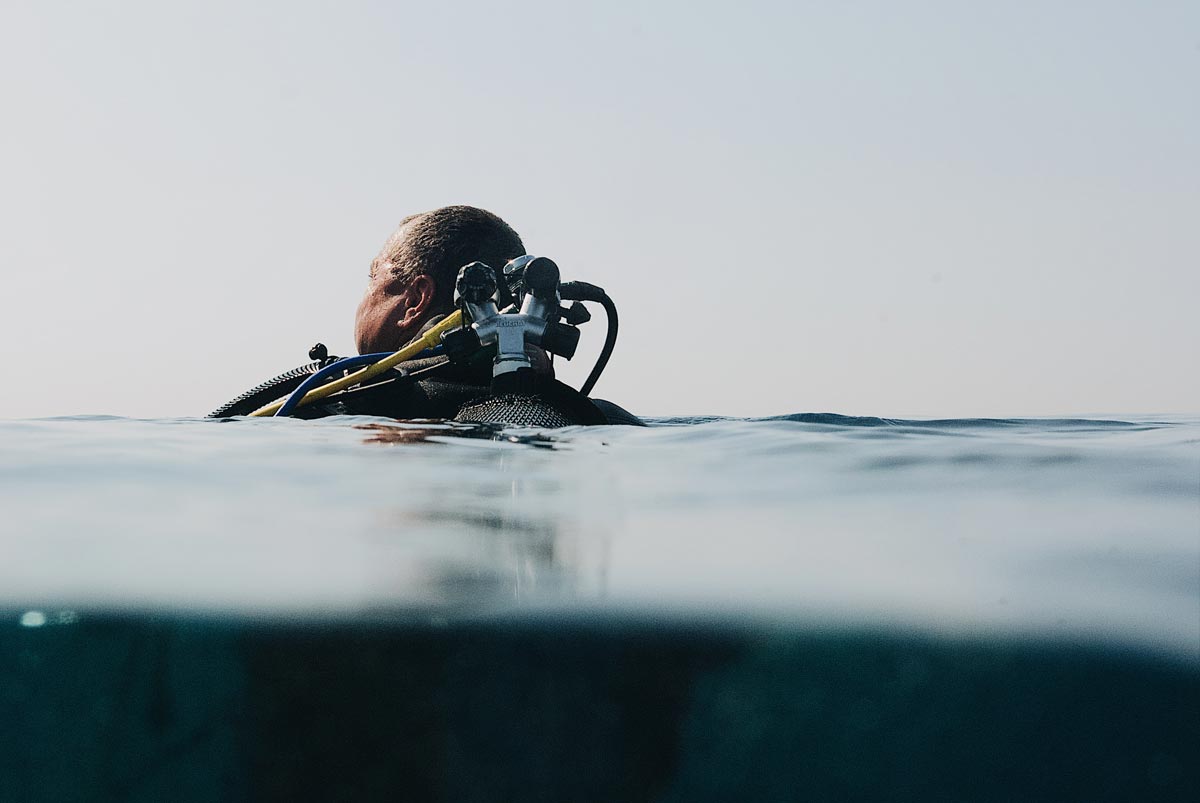
How much does a Scuba Diving course cost?
The price of an Open Water course depends on where you complete it. In Asia and South America, for example, the course is around $350, whereas in the USA it can be close to $650-750.
It’s good to check whether the price includes all study materials and equipment so you don’t get surprised by any additional costs later on.
What are my options when looking for a Scuba Diving course?
There are many scuba diving agencies to do a beginner scuba diving course.
- PADI: Professional Association of Dive Instructors (the most well known in most parts of the world)
- SSI: Scuba Schools International
- NAUI: National Association of Underwater Instructors
- SDI: Scuba Diving International
- NASE: National Academy of Scuba Educators
- PSAI: Professional Scuba Association International
- BSAC: British Sub-Aqua Club
If you decide to learn with smaller agencies it’s important to check that the certification you will gain is recognized around the world.
After I’m certified, what comes next?
Once you’ve completed your Open Water course there are lots of options for your next steps:
- Fun diving: When you’re certified as an Open Water diver, the world is your oyster! You can book fun dives (up to depths of 59ft/18m) and enjoy the underwater scenery wherever you go. It’s a good idea to log your dives (your dive center should have paper log books for you, or you can go digital). Logging your dives not only allows you to keep track of what you saw, how deep you went, how many dives you have done and little bits of information you want to remember. It’s also proof of your dive count should you need that. Some dive centers will ask to see proof of a certain amount of dives for wreck diving for example, or strong drift dives. It’s important not to dive at sites that you’re not ready for.
- Further education: If you love to learn, there’s lots more options ahead. The Advanced course could be your next step. This course is really fun, it consists of five “Adventure” dives. You have to do the Deep Adventure dive which takes you down to 98ft/30m, and you have to do the Navigation Adventure dive, which teaches you important skills about how to navigate a dive site. The last three, you get to choose! There’s a few options depending on what your dive center has access to, for example Wreck Adventure dive, Drift Adventure dive and Underwater Photography Adventure dive. Ask your center what your options are. After the Advanced course you can go on to do the Rescue course which teaches you very useful and important rescue skills in case you ever need them.
- Specialties: Specialties are short courses in which you can explore certain aspects of diving that you are interested in. There are many options for specialties, including Wreck specialty, Enriched Air specialty, Deep specialty, Peak Performance Buoyancy specialty, and more. Ask your dive center what your options are. Once you complete five specialties and 50 logged dives you can achieve Master Scuba Diver — the highest level of recreational diving.
- Go professional: When you do your Open Water course you might look at your instructor and think “Wow, they are living the dream”. Well that’s not far from the truth. Becoming a professional scuba diver allows you to travel the world and live in some of the most beautiful places, all while earning an income. You get to take students on their first underwater experience and watch them grow with confidence. If you think this could be the job for you, you would first need to become a Divemaster. A Divemaster’s job is mainly to guide dives and assist the instructors on courses. Finally, you can become an instructor and teach the courses.
- Technical diving: Technical diving is not recreational diving. There are many forms of technical diving which involve mixing different gases to breathe underwater and taking extra tanks with you on dives. This allows the diver to stay underwater for a long time and go to much greater depths. There is a lot of pre-dive planning involved.
Now you have all the information you need to begin your scuba diving journey. What are you waiting for?

